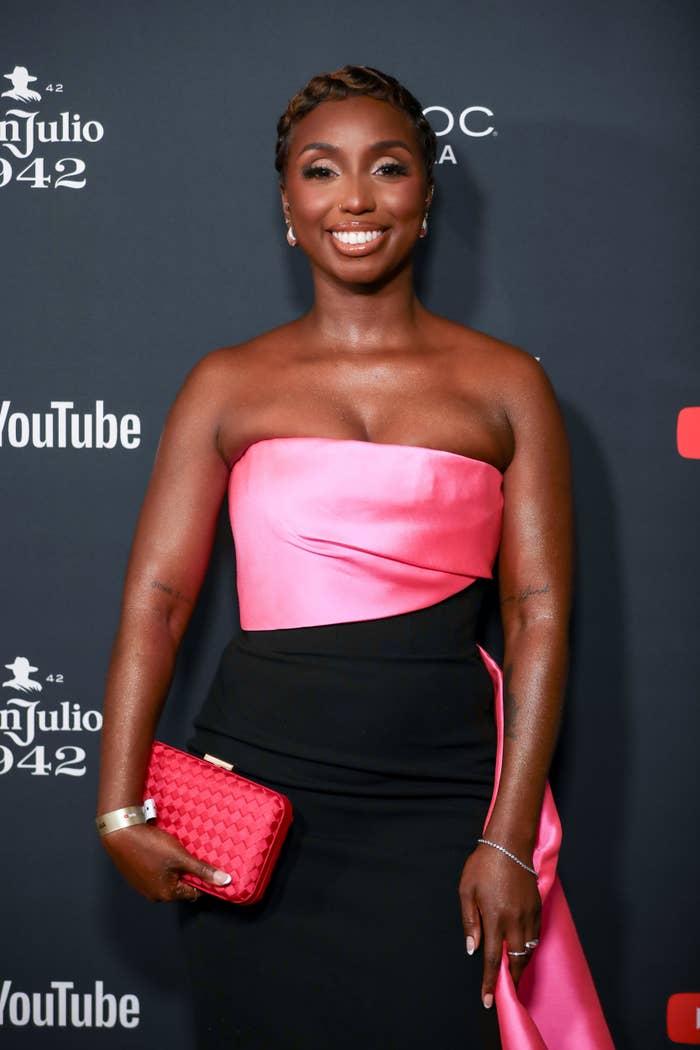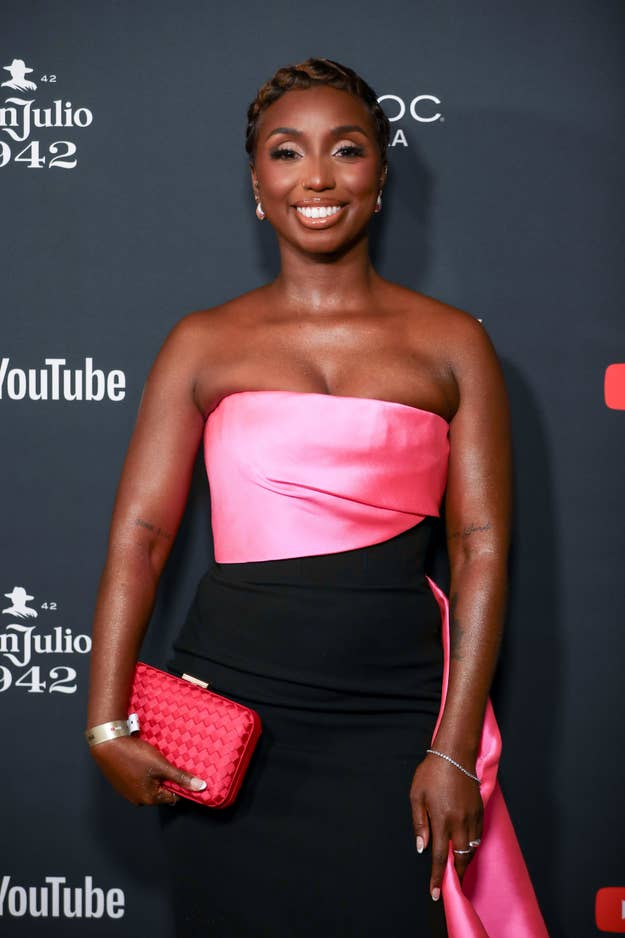
Since stepping into her role as YouTube’s Artists Relations Manager for Black Music & Culture in 2019, Sheniece Charway has propositioned herself as one of the leading figures catalysing change and advocating for Black culture and talent.
Sheniece’s journey shows a reputable trail of relentless commitment to championing greatness, all while crafting spaces for diminished voices to thrive and tackling systemic racism head-on. With her influence reaching far beyond YouTube’s LDN HQ in King’s Cross, she has played a critical role in developing and throwing cutting-edge events that are centred around giving flowers to some of the most iconic artists and industry insiders alike.
From GRM Daily’s Discography sessions with Wretch 32 and Ghetts to putting on fan events and single/album release parties for the likes of Tiwa Savage and Michael Brun, Sheniece has given a blueprint to those after her on assembling a stage for Black talent to truly thrive. Having gained top accolades such as Music Week’s Rising Star Award at the 2021 Women In Music Awards and the Best Publicity Award at the Young Music Boss Awards earlier this year, it’s fair to say she’s a trailblazer in every sense of the word.
Filled with a strong desire to celebrate UK Black culture in music, in 2020, Sheniece curated The Excellence Brunch—hosted by YouTube luminaries Lyor Cohen and Tuma Basa—which united UK and international artists, industry execs, creators and cultural influencers. The brunch became the launchpad for an ongoing series of initiatives from YouTube, all led by Sheniece. At the centre of her mission is the Legacy series—a year-long calendar of events whose central aim is to raise awareness surrounding Black issues through the power of art and music.
Sheniece Charway’s sheer existence is proof of the countless avenues creatives can take in the arts and culture space. We caught up with the music exec to talk about how her upbringing helped shape her career, being inspired by other Black women in the industry, and the bright future of YouTube’s Legacy series.
“I know a lot of assistants, A&Rs and PRs—people behind the scenes—who never get to be celebrated. I wanted to create an initiative that allowed us to celebrate their voices, too.”
COMPLEX: How do you think your early upbringing helped shape your career path today?
Sheniece Charway: I was lucky enough to be in a household with a lot of music. I’m from a big family: there were six of us in the house, so, quite a few. My sisters and brothers are very much into hip-hop, so I was always listening to Biggie and Tupac; my dad loved reggae—he listened to a lot of Bob Marley—and my mum used to do a lot of Highlife. So I was always around music, and I knew that I loved it early on, which has helped shape my love for music as a whole.
Before you joined YouTube, you were a Marketing Assistant at Columbia Records. What were some key takeaways from your time there, and how do you think it helped your understanding of the music industry?
Columbia Records was such a great place to work. You work across all the teams, from press and communications to A&R, and you’re in the mix of everything. You get to work so closely with the marketing managers who make the decisions, so you’re exposed to everything and that helped me understand, like: everyone has different goals. Everyone has other things they’re trying to work on, but you have to piece it together, especially as a marketing assistant. You’ll be the one who knows everything. It helped me to organise myself, especially in these big companies because there are so many stakeholders.
As an Artist Relations Manager for Black Music & Culture at YouTube, you’ve been involved in several events and initiatives celebrating Black talent and culture. Can you share some key insights into how these events have contributed to the empowerment of Black artists and their representation?
The Legacy series, which I spearhead, allows people to understand that we’re here to help, empower, and push the culture as much as possible—on and off the platform. I remember when I used to be at a label, everyone used to go to the MOBOs and Rated Awards, and I wasn’t always able to go but I knew how much work I would put into these campaigns, and I know a lot of assistants, A&Rs and PRs—the people behind the scenes—who never get to be celebrated. I wanted to create an initiative that allowed us to celebrate their voices, too.
What’s your overall vision for the Legacy series?
My vision for Legacy in the next five years is that I would love it to be a staple initiative within UK Black culture, and maybe globally. I want it to be ongoing. I don’t want it to be a season. There’s still so much change, so I think, for me, it’s just making sure that everyone understands that Legacy is here to stay, and we will continue to empower and celebrate the Black creatives in front of and behind the cameras because it’s very important.
“We’re in such a great position where Black women are everywhere now—it’s great to see. I have so many allies and friends who are Black women doing amazing things.”
You were awarded Music Week’s Rising Star Award in 2021 and you took home the Best Publicity Award at the Young Music Boss Awards in 2023. How do you think such recognition can inspire and pave the way for other Black people aspiring to impact the culture and music sector behind the scenes significantly?
It’s so great to have these awards, to recognise certain people who have been able to pave the way or do things that are not the norm. But there’s the emphasis on not constantly feeling that you must win awards to show that you’re important. I’m so grateful to be able to do all those things in an industry where many people might not look like me work in these spaces. It’s nice to recognise that and show the next generation that it can be done. I grew up on an estate. I never thought I’d be in the position that I’m in today.
Black women have played a noteworthy role in UK music and culture. How have other Black women influenced your career path?
We’re in such a great position where Black women are everywhere now—it’s great to see. I have so many allies and friends who are Black women doing amazing things, and it’s just like, “That person looks like me! That woman has the same interests as me.” And it’s so important to see those things across the board. Grace Ladoja is an excellent example of someone who’s really made things happen. Her agency Metallic Inc, which helped me with the Legacy party, and other agencies that understand culture are super important. There are a lot of Black women who are continuing to pave the way but also bring the next generation through. I can probably name 50 or 60 Black women in the music industry who are doing amazing things. It’s such a beautiful time to work in the industry because there are so many of us, and we can all support each other.
As an ambassador for PRS’ Power Up campaign, you advocate for addressing anti-Black racism within the music industry. What steps can organisations and individuals take to create a more inclusive and equitable industry?
The first step is understanding the problem. What is the cause of the problem? And how can you resolve it? I think people often just say we need more Black people in, but why? What should they be doing? How do you train them? And I think a lot of the time, especially after Black Lives Matter, it’s like, “Oh, we need to fix the problem now!” And it’s not a problem that you can fix overnight without really understanding the problem and why there’s so much underrepresentation within these spaces. Once we address that, we will know how to move forward and have a proper plan that helps.
What else do you see yourself embarking on doing within the music industry?
Music is my thing, but I also love fashion. I love dressing up [laughs]. I love buying new clothes. So whether it’s something to do with a fashion brand and music, that might be something I look at in the future. But I really just want to continue to bring in the next generation of Black creatives. A mentoring scheme could be a thing, for sure. There’s a lot of things I’m able to do at my role in YouTube, so we’ll see how it all goes. I want to make sure I grow as a person while ensuring YouTube is a part of our journey.

